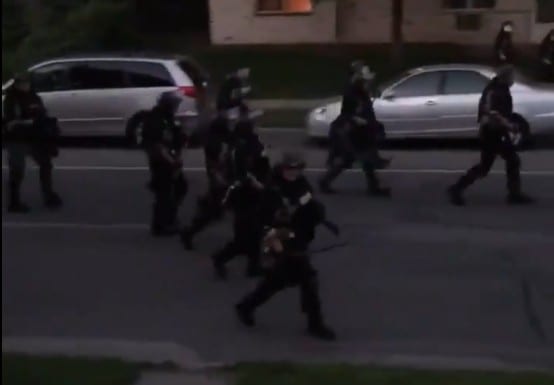Given the current news I think it might be timely to discuss an old white politician who died 170 years ago on the other side of the ocean. Watching police run riot in cities across the country has me thinking about Sir Robert Peel.
Peel was the prime minister of the UK (twice) and also served as its home secretary (also twice). He started out as a Tory, then founded Britain’s Conservative Party, and ultimately finished his career as a Peelite because by that point the easiest way to describe his political ideology was by just calling it his political ideology.
What Peel is probably most famous for, though, is something else that bears his name — “bobbies.” That’s one British nickname for the police, a name they get from Sir Robert who, in many ways, invented them. Scotland Yard was his idea. This is why Peel is also sometimes called the “Father of Modern Policing.”
I wouldn’t call him that because I’ve seen modern policing and I don’t think it looks anything like its supposed father.
Peel’s big idea was that law enforcement and public order shouldn’t be maintained by soldiers. That’s just military occupation by another name and it would be incompatible with a free society. That would be true, Peel believed, wherever soldiers were tasked with acting like police officers and it would also be true wherever police officers were tasked with acting like soldiers.
This is the common thread running through all of Peel’s nine Principles of Policing, which he first published in 1829: Police are not soldiers. And whenever they act like soldiers, they thereby cease to act like police, which is to say they cease to act legitimately.

Peel’s principles are sometimes described as his rules for “ethical policing.” That’s sort of true and sort of not because it’s redundant. Peel believed — correctly — that if it isn’t ethical, then it isn’t policing. There was not and could not be any such category as “unethical policing,” as all that describes is criminality in a fancy uniform and, ultimately, the precise form of brutal and corrupt military occupation that having a civilian police force is supposed to prevent.
I appreciate that Scotland Yard and all of its bobbies and peelers haven’t done a spectacular job in living up to their Peelian ideals over the last 191 or so years. But I also think it’s at least somewhat better to fail in the attempt to live up to noble principles than it is to fail because you have none, which is what it seems we’ve been seeing from American police in dozens of cities these past few days.
In any case, here are Sir Robert’s principles. I can imagine a better world in which these were the basis of legitimate policing. But I’ve never had the experience of living in that world.
1. The basic mission for which police exist is to prevent crime and disorder as an alternative to the repression of crime and disorder by military force and severity of legal punishment.
2. The ability of the police to perform their duties is dependent upon public approval of police existence, actions, behavior and the ability of the police to secure and maintain public respect.
3. The police must secure the willing cooperation of the public in voluntary observance of the law to be able to secure and maintain public respect.
4. The degree of cooperation of the public that can be secured diminishes, proportionately, to the necessity for the use of physical force and compulsion in achieving police objectives.
5. The police seek and preserve public favor, not by catering to public opinion, but by constantly demonstrating absolutely impartial service to the law, in complete independence of policy, and without regard to the justice or injustice of the substance of individual laws; by ready offering of individual service and friendship to all members of society without regard to their race or social standing, by ready exercise of courtesy and friendly good humor; and by ready offering of individual sacrifice in protecting and preserving life.
6. The police should use physical force to the extent necessary to secure observance of the law or to restore order only when the exercise of persuasion, advice and warning is found to be insufficient to achieve police objectives; and police should use only the minimum degree of physical force which is necessary on any particular occasion for achieving a police objective.
7. The police at all times should maintain a relationship with the public that gives reality to the historic tradition that the police are the public and the public are the police; the police are the only members of the public who are paid to give full-time attention to duties which are incumbent on every citizen in the intent of the community welfare.
8. The police should always direct their actions toward their functions and never appear to usurp the powers of the judiciary by avenging individuals or the state, or authoritatively judging guilt or punishing the guilty.
9. The test of police efficiency is the absence of crime and disorder, not the visible evidence of police action in dealing with them.












